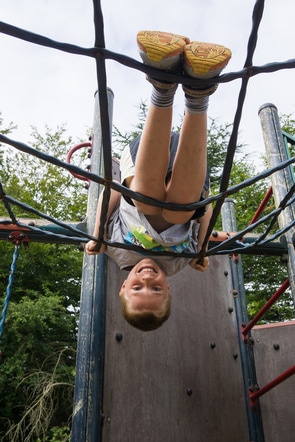ADD? ADHD? Or The Kinesthetic Child
(Series: Understanding Your Child's Communication/Modality/Learning Style)
Digital-Kinesthetic-Visual-Auditory
Through life coaching, we learn to identify communication styles or "modality" in adults and children. Modality is defined as: "A particular mode in which something exists or is experienced or expressed." Our modality, communication or learning style, is how we operate, communicate and learn in life. It is inherent, and just part of who we are. A child's primary modality is central to how they experience and interact with the world, and can be indicative of their greatest strengths. Identifying and learning how to communicate and teach our children through their strongest modality, is the best way to help them reach their full potential.
There are four communication styles or modalities, they are: Visual, Auditory, Kinesthetic, & Digital. We all have all four of them, but the two we assess highest in are usually indicative of how we move about and operate in life.
The Kinesthetic Child
When assessed, most people rate highest as a combination of Kinesthetic and Visual. Forty percent of people are highest in Kinesthetic or operate in life Kinesthetically. So a large group, but not even one half of the population, or less than fifty percent of a classroom. Kinesthetic people are known for being intuitive, feeling and caring, but they are also known as being "moving" people, they like to move or be active while communicating, learning, and operating in life.
In school, children who are Kinesthetic learners are the children who are always active, they want to move around, touch, feel, and try out everything. It is very difficult for them to sit still while learning, actually, they learn best if they can do it while moving; balancing on a ball, jumping up and down, pacing, or fidgeting. This causes them to stand out and many times be disciplined for their need to move. Kinesthetic children are also the children who will have higher intuition and sensory perception. They will notice things before others, changes in temperature, mood, volume, light, and more, and are often teased and or labeled as too sensitive, too picky, or even weak and selfish for their notice of changes in comfort. They often get labeled with learning or behavioral disorders, when there is nothing wrong with these children. They are just more active and physically and emotionally more perceptive. They just need to be taught in a different way, a way that takes these inherent traits into consideration. It is up to the parent or teacher to adjust their teaching style to the child, not expect the child to adjust to "the norm," or the way the other students in the class operate and learn.
To engage a Kinesthetic child try using:
For additional homeschooling/teaching strategies see:
Kinesthetic Learning - General Strategies For Teachers/Homeschoolers & Strategies Per Subject or these videos: Kinesthetic Learners or The Naturalistic Learner
When assessed, most people rate highest as a combination of Kinesthetic and Visual. Forty percent of people are highest in Kinesthetic or operate in life Kinesthetically. So a large group, but not even one half of the population, or less than fifty percent of a classroom. Kinesthetic people are known for being intuitive, feeling and caring, but they are also known as being "moving" people, they like to move or be active while communicating, learning, and operating in life.
In school, children who are Kinesthetic learners are the children who are always active, they want to move around, touch, feel, and try out everything. It is very difficult for them to sit still while learning, actually, they learn best if they can do it while moving; balancing on a ball, jumping up and down, pacing, or fidgeting. This causes them to stand out and many times be disciplined for their need to move. Kinesthetic children are also the children who will have higher intuition and sensory perception. They will notice things before others, changes in temperature, mood, volume, light, and more, and are often teased and or labeled as too sensitive, too picky, or even weak and selfish for their notice of changes in comfort. They often get labeled with learning or behavioral disorders, when there is nothing wrong with these children. They are just more active and physically and emotionally more perceptive. They just need to be taught in a different way, a way that takes these inherent traits into consideration. It is up to the parent or teacher to adjust their teaching style to the child, not expect the child to adjust to "the norm," or the way the other students in the class operate and learn.
To engage a Kinesthetic child try using:
- play acting
- sports
- dance
- singing
- crafting; cutting, pasting
- creating or building
- cooking
- finger painting
- playground
- balls
- moving or racing toys
- sensory play; touch, textures
- sensory aids: fidgets, ball chairs, personal size trampolines
For additional homeschooling/teaching strategies see:
Kinesthetic Learning - General Strategies For Teachers/Homeschoolers & Strategies Per Subject or these videos: Kinesthetic Learners or The Naturalistic Learner
Partial Bullet List: www.ronitbaras.com
When you know a child's communication and learning style, or modality in life, it makes it much easier to work with them. With this newfound knowledge, things that were seen as problems before, are now understood as just being part of who your child is. When working with Kinesthetic children, small adjustments to your parenting or teaching routine that take into consideration the child's need to move and be comfortable while learning, will lead to improvements in the child's outlook and well being, soon resulting in a child who is engaged, excited and happy about life and learning.
Hugs & Happy Parenting!
Julie L Gibson-Vasquez
The Proactive Parenting Coach
Hugs & Happy Parenting!
Julie L Gibson-Vasquez
The Proactive Parenting Coach






